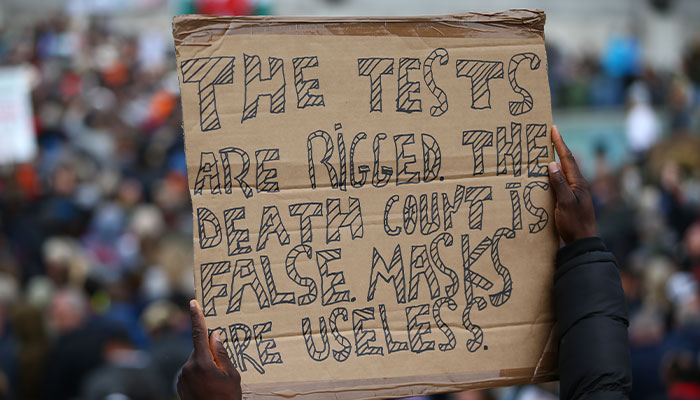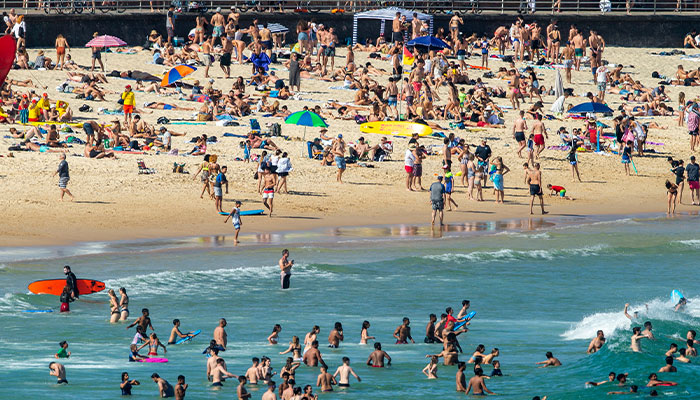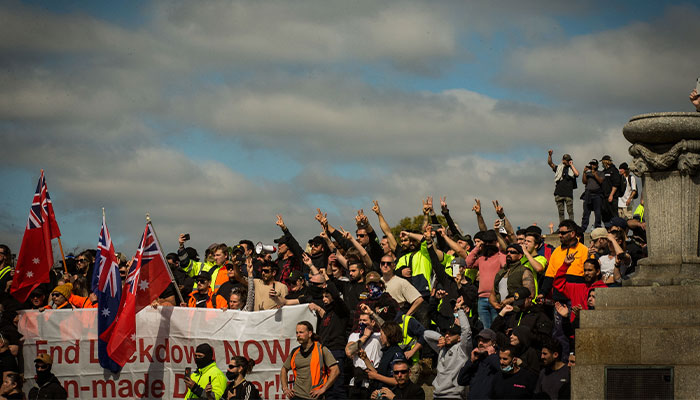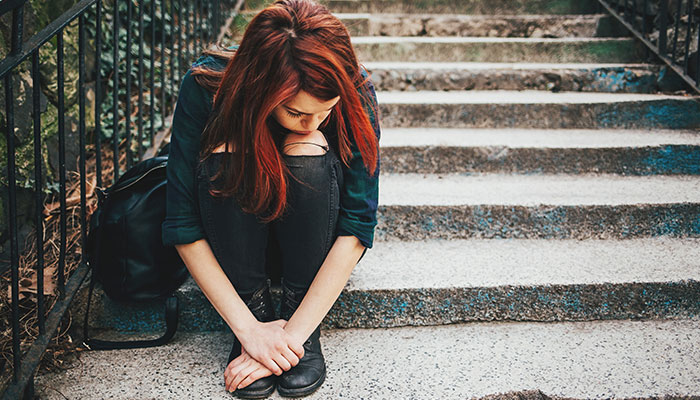THE SOCIAL-EVOLUTIONARY PSYCHOLOGIST
Associate Professor Trevor Case, Department of Psychology
Social psychologists have long been interested in people’s inclinations to follow the rules and go along with others. Some of their earliest experiments showed that people are natural conformers, and you don’t even need to do experiments to see this. Take fashion, for example – a few teenagers start wearing jeans slung low showing their underpants and suddenly it’s ‘the thing’.

Sign of the times: Once reactance takes hold, it can result in rationalisations such as, masks are ineffective, or vaccination is pointless, says Dr Case.
In our Western, individualistic culture most of us tend to think, ‘I am my own person and I don’t follow others’, but in fact we all do follow others, and we do that much more than we think. What’s more, we are usually very compliant with what we have been asked to do.
With COVID restrictions, and some of them have been severe, the majority of people have consistently followed the rules and gone along with what they have been asked to do. Given this tendency to comply, it’s those instances of people not being compliant and breaking the rules that is more noticeable and surprising.
A very recent study about mask-wearing carried out in the US and Canada found that while 85 per cent or more of people were fully compliant with all the mask-wearing regulations, 10 to 15 per cent were only compliant every now and again, or didn’t want to follow the rules at all.
It is psychological reactance – described as the motivation to regain a freedom after it has been lost or threatened – that explains some people’s refusal to follow mask-wearing rules.
Originally, I thought it might be high-status people who would break these rules more than others, because there is a weight of empirical evidence in social psychology that people who are wealthy and powerful are more likely to follow self-interest than to do what other people want.
In fact, the evidence shows that high-status people generally tend to be less empathic, more anti-social and rude when they are talking, and less likely to take other people’s perspectives into account. One study in the US looked at cars at pedestrian crossings, and found that people in expensive, high-status cars were less likely to stop for pedestrians than people in cheaper, lower-status cars.
But recent research has not shown a relationship between high income and resistance to mask-wearing, primarily because the rule-breaking tendency among high-status people doesn’t occur if it puts them at risk – that is, the wealthy are compliant with mask-wearing out of self-interest, because masks keep them safe.

On the beaches: Despite various public health orders, Sydneysiders have flocked to beaches during the pandemic, raising concerns about social distancing.
Rather than high status, then, recent research suggests that it is psychological reactance – described as the motivation to regain a freedom after it has been lost or threatened – that explains some people’s refusal to follow mask-wearing rules. Basically, people don’t like being told what to do, particularly when it restricts their freedoms. And when you think about all the rules we have under lockdown – not just about mask-wearing, but including restrictions on travel and visiting friends – these regulations restrict our freedom, and a small proportion of people get very upset by that.
Everyone experiences some psychological reactance. If someone gives you an order, tells you what you should be doing, even a friend giving forceful advice, it can get our backs up. Even little kids show this: classic experiments with children show that it is the toy that they are prohibited from playing with that they want the most. Adolescents, too, are renowned for their psychological reactance to parental restrictions.
In the context of the pandemic, psychological reactance can account for much of the intentional rule-breaking amongst a minority of the population. And once reactance takes hold, it can result in rationalisations such as, masks are ineffective, vaccination is pointless, or COVID is a conspiracy.
- In a crisis, it's the cimple things that can boost your mental health
- Please explain: Can we control ou dreams?
These arguments undermine the perceived value of the COVID restrictions and, in turn, increase hostility about having to comply with them. In a bid to maintain their freedom, even when they are putting their own lives in danger, highly reactive people choose to do the opposite of what is required.
Given the power of psychological reactance, what can be done do to bring this minority on board with the safety measures that protect both themselves and everyone else?
If the visual signs of COVID infection were more obvious and commonplace– if we could tell just be looking at someone that they were infected – it would be much more difficult for people to maintain rule-breaking attitudes. So, for authorities dealing with rule-breakers who don’t perceive COVID as a threat, it is important to provide vivid evidence of the threat (e.g., bedside testimonials from those who have been hospitalised with COVID) to keep it real.
Also, just like teenagers, people prefer to be persuaded to do the right thing than to be ordered to do it. Reducing psychological reactance, then, is about not antagonising people with threats to their freedom. A better idea is to frame the message around COVID restrictions in terms of personal choice. For example, a message like, ‘I choose to protect myself and my family” with a picture of someone wearing a mask, makes it clear that COVID is a threat to you and those you care about, but that you have the power to do something about it. Then thank them for choosing that option.
THE CRIMINOLOGIST
Vincent Hurley, Associate Lecturer in the Department of Security Studies and Criminology
People commit crime, or break the law, for six reasons – lust, anger, greed, revenge, excitement or ego. Those are motives. And people don’t comply with the law because they make the rational choice not to. They think their criminal act is worth the risk to themselves and the consequences for society – and they will break the law because of their previous experience with it; if they feel that the police have treated them unfairly, they will see it as an opportunity to rebel, to pay back.

On the streets: Anti-lockdown protesters in Melbourne ... a very small portion of the community react out of ego to say “the state can’t tell me what to do”, says Mr Hurley.
When it comes to the demonstrations against lockdowns, my feeling is, they are not doing it out of anger; I think most do it for ego, and see it as an opportunity to rebel against the system - “I don’t give a stuff what they say; I will show them you can’t impose these rules on me”.
You can see anger being the motivation for a demonstration against the lack of action on climate change, where you see a greater groundswell or extent of purpose across the community. The anger is felt, it has a different intrinsic trigger within individuals, so we would protest in anger against the government’s inaction, and it would be in greater numbers than a demonstration where the motivation is ego.
This is because it is a very small portion of the community reacting out of ego, just to say, “the state can’t tell me what to do” and it wouldn’t matter what the issue was - Covid is just the justification; and that justification could be that they don’t like pink teddy bears.
You are always going to have a section of the community who for whatever reason are never going to comply with the law … they see it as acceptable not to.
The vast majority of people comply with the COVID rules because they believe it to be legally and morally correct to do so. And they are willing to exercise instrumental compliance – to give up a part of their freedom for the greater good and put conditions on themselves, to police themselves, for the betterment of society.
You are always going to have a section of the community who for whatever reason are never going to comply with the law … they see it as acceptable not to.
They are not interested in the greater good not because they are blind to it – although there may be a section who are conspiracy theorists and see their own beliefs as somehow tied up in the greater good – but because they choose to ignore it: their focus is not on themselves, it is on the state.
- Why you should be excited about open banking
- Stress-busting tips for HSC students facing lockdown learning
Police represent the state’s authority, and legislation is giving police the power to do whatever they can to prevent people from breaking the COVID rules. Generally, policing a recalcitrant section of the community who won’t comply with a law is not a major issue but now, in a situation where their actions are going to have massive consequences on health and the health system, it is of major concern.
Interestingly, going back centuries to ancient Athens, it was the role of the ‘police’ to keep the city in good health and condition – they policed health rather than the population; the word ‘police’ comes from the ancient Greek word ‘polis’, which translates into city.
The role of police is so varied it beggars description. Two years ago, if they had said police are going to be used to police a disease, 99 per cent of people would have said, ‘Why? That’s not the job of the police, I just can’t ever see that happening’.
It is the right response to give the police a greater footprint in society during this once-in-our-lifetime crisis in order to protect health and safety for the greater good. Police are holding people to account for their intentional actions, in a social context where it is very difficult for citizens to hold each other to account.
Trevor Case is an Associate Professor in the Department of Pyschology
Vince Hurley is an Associate Lecturer in the Department of Security Studies and Criminology



